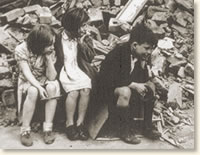|
"The worst night of the Blitz occurred on its last night
- May 10, 1941
- when 3,000 Londoners were killed."
The Blitz was the name given to the prolonged period of bombing of British cities, which began in September 1940 and
lasted until November. the worst affected city was London, where 13,000 people were killed in 1940. In the rest of Britain
10,000 people were killed. Coventry was hit by a very heavy raid in November 1940, which destroyed the centre of the city
and killed about 500 people. Belfast was not bombed until April 1941, when the "Belfast Blitz" killed nearly one thousand
people.
the Blitz began after Hitler gave up his attempt to invade Britain in September 1940; this had been called "Operation
Sealion".
|
|
|
He was trying to force Britain to surrender. the Blitz was really intended to break
the morale of the British people. If they saw their homes being destroyed and their loved ones being killed, Hitler believed
that they would force the government to come to terms with him.
The Blitz was also an attempt to destroy industry. In
London the docks were attacked regularly and this meant that people living in the East End were often bombed. the Luftwaffe,
the German airforce, also tried to hit railway lines and junctions.
At the time the government would only allow stories
to be published in newspapers which said how well the British people were coping. "Britain can take it" was one slogan. This
was an example of propaganda.
In fact there are many examples
of people being very near to total despair in the winter of 1941. the Blitz had much more devastating effects than the government
was prepared to admit:
In October 1940 Balham underground station was hit by a bomb that burst a water main. Sixty-four
people drowned. This story was never released until after the war, because many people sheltered from air raids in underground
stations. If they had found out what had happened there might well have been panic.
Overall bombing had very little
effect on the war effort. Most factories recovered from the effects of an air raid in two to three days and the total loss
of life from air raids was about 60,000. This was far less than had been expected at the beginning of the war.
|
fascinating material
from the BBC
sorting the myth
from the reality
A Memoir of The Home Front

|
| Children sit among the rubble of their home |
|

